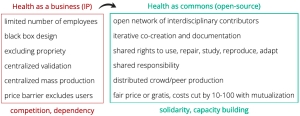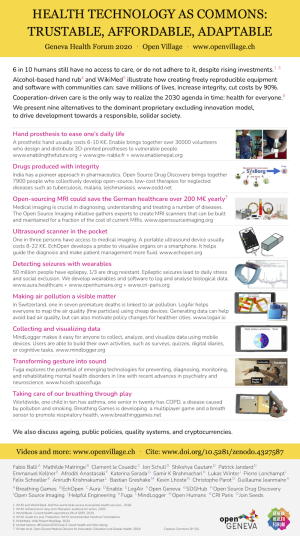Geneva Health Forum Open Village/en
The GHF Open Village is a series of participatory activities to value health as commons during the Geneva Health Forum.
It is a joint event of the Geneva Health Forum and Open Geneva, realized by Breathing Games.
Initial observation

6 in 10 humans still have no access to care,[1] or do not adhere to it,[2] despite rising investments.[3]
Alcohol-based hand rub[4] and WikiMed[5] illustrate how creating freely reproducible equipment and software with communities can: save millions of lives, increase integrity, cut costs by 90%.[6]
Cooperation-driven care is the only way to realize the 2030 agenda in time: health for everyone.[7]
We present alternatives to the dominant proprietary excluding innovation model, to drive development towards a responsible, solidar society.
Purpose
Mission
We federate not-for-profit communities enhancing collective health, enabling individuals to better take care of their health, and build more resilient healthcare systems through co-created, freely reproducible technologies.
We lead and support a set of cooperation-driven, multidisciplinary, science-backed projects that foster solidarity and peer to peer contribution.
We strive to mutualize efforts and tools, and help shape a common-ground for like-minded projects to work together on common outcomes.
Values
For us,
- quality of cooperation prevails over competition
- mutual support prevails over technical expertise
- freedom of adaptation rather than excluding propriety
- with and by user communities rather than for them
- creation-as-research[8] rather than research after creation
Benefits
For people taking part in the GHF Open Village, we envision following benefits:
- sharing practices including open design, manufacturing of medical devices vs reproducibility, multidisciplinary community building, etc.
- mutualizing resources such as expertise of people affected, access to caregivers, health data infrastructures etc.
- developing common projects such as raising funds to test devices in various settings, hosting events to raise awareness on open health, etc.
- advocating for ‘public money, public-driven innovation’ policies in healthcare[9]
First edition
In 2020, we organized a series of twenty hands-on events, detailed with their outcomes:
A poster synthesis was released in the nine most spoken languages:
- English – Health technology as commons: trustable, affordable, adaptable.
- Chinese – 公有制下的健康科技: 可信赖, 可负担, 可适应.
- Hindi – आमजन-स्वामित्व के रूप में स्वास्थ्य प्रौद्योगिकी: विश्वसनीय, अनुकूल एवं किफ़ायती.
- Spanish – La tecnología de la salud como común: confiable, asequible, adaptable.
- Arabic – تكنولوجيا الصحة ذات الملكية المشتركة : موثوقة، متاحة وقابلة للتكّيُف.
- Bengali – সর্ব সাধারনের জন্য সাস্থ্য প্রযুক্তিঃ বিশ্বাসযোগ্য,সাশ্রয়ী,অভিযোজনযোগ্য.
- French – Technologies de santé en communs : fiables, abordables, adaptables.
- Russian – Технологии здравоохранения для всех: надежные, доступные, адаптивные.
- Portuguese – A tecnologia de saúde como comuns: confiável, acessível, adaptável.
Second edition
In 2022, we will invite interested communities to propose activities around health commons, see
People sending proposals will be invited to self-assess their project using a grid developed by co-hosts (^).[10]
Core contributors
The GHF Open Village was initiatied in October 2019 (*), and its purpose refined early 2021 (^). New co-hosts joined for the second edition (s)
- Patrons
- Eric Comte* – executive director of Geneva Health Forum
- Thomas Maillard* – co-founder of Open Geneva
- Lead
- Fabio Balli*^ – co-founder of Breathing Games
- Co-hosts
- Key supporters
- Katerina Serada – policy analyst
- Jon Schull – founder of E-nable
__________
- ↑ WHO and World Bank. Half the world lacks access to essential health services… 2018. https://www.who.int/news/item/13-12-2017-world-bank-and-who-half-the-world-lacks-access-to-essential-health-services-100-million-still-pushed-into-extreme-poverty-because-of-health-expenses
- ↑ WHO. Adherence to long-term therapies: evidence for action. 2003. https://www.who.int/home/cms-decommissioning
- ↑ World Bank. Current health expenditure (% of GDP). 2020. https://donnees.banquemondiale.org/indicateur/SH.XPD.CHEX.GD.ZS
- ↑ WHO. Guide to Local Production: WHO-recommended Handrub Formulations. https://www.who.int/gpsc/5may/Guide_to_Local_Production.pdf
- ↑ WikiMedia. Wiki Project Med/App. 2020. https://meta.wikimedia.org/wiki/Wiki_Project_Med/App
- ↑ Winter et al. Open Source Medical Devices for Innovation, Education and Global Health. 2018. https://www.researchgate.net/publication/329072770_Open_Source_Medical_Devices_for_Innovation_Education_and_Global_Health_Case_Study_of_Open_Source_Magnetic_Resonance_Imaging_Reshaping_Business_and_Society_in_the_Era_of_Bottom-up_Economics
- ↑ United Nations. #Envision2030 Goal 3: Good Health and Well-being. https://www.un.org/development/desa/disabilities/envision2030-goal3.html
- ↑ Champman OB, Sawchuk K. Research-Creation: Intervention, Analysis and "Family Resemblances". Canadian Journal of Communication 2012; 37(1). https://cjc-online.ca/index.php/journal/article/view/2489
- ↑ Free Software Foundation Europe. Public money, public code. 2021. https://publiccode.eu
- ↑ Last page of Balli, F, Ibbotson R, Chhabra V, Pimentel JP, Suturin V, Falcon L, Timm-Bottos J, Kellner E, Menon J, Bechard N, Matringe M, le Couedic C. Open-source respiratory health commons. 15 projects communities can adapt, repair, reproduce for low cost medical care (libre and open-source tech). General meeting of the Global Alliance against chronic Respiratory Diseases 2020-2021. Zenodo 2021. https://doi.org/10.5281/zenodo.5515632
